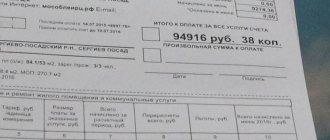The sequence of re-registration of a utility personal account after purchasing a home
When purchasing real estate, it is very important to make sure that there is no debt for utilities. An extract by financial number will help with this. It shows what payments were made, when and for what amount.
Immediately after purchasing a home, the new owner needs to re-register the personal account of the property.
If real estate is purchased as shared ownership, then each owner must submit an application separately.
The personal account itself is a repository of information about the home, owners, payment history for housing and communal services and standards for the use of electricity, water, gas, etc. This accounting is carried out by the management company. She also re-registers it in the event of a change of owner of the property.
Algorithm of actions
According to Article 153 of the Housing Code of the Russian Federation, the new owner of the home has the opportunity to rewrite the personal account immediately after registration of documents on ownership. To do this, you should obtain an extract from the Unified State Register of Real Estate.
Immediately after completing the documents, you must contact the ERCC. This organization requires a report on the debt to the old owner.
After receiving all the necessary documents, the re-registration of the personal account begins. The algorithm for this action consists of the following stages:
- Submitting an application to the ERCC to transfer the account to a new owner.
- Visit to the management company to renegotiate the agreement for the supply of services.
- Re-registration of documents.
- Solving problems with installation/repair/refurbishment of meters. If the 3-year warranty period for measuring instruments has expired, service provider companies must provide specialists to test the operation of the equipment.
- The HOA and the management company review the submitted documents. If the papers are in order, then the personal account is re-registered.
The entire process of considering an application to the HOA and management company takes from 3 to 5 days.
Required documents
Along with the application on behalf of the new owner, a package of documents must also be submitted to re-register a personal account.
These papers should contain information:
- About the total area of the apartment, number of rooms, floor.
- About the house itself.
- About comfort: the presence of centralized heating, hot and cold water supply, garbage chute, elevator, etc.
- About the number of people living. Only registered persons are counted.
- About available subsidies and benefits for paying for housing and communal services.
- About the availability of gas, electricity, water meters.
The documents must also indicate the exact address of the home.
All necessary data can be obtained from the technical passport of the apartment.
In addition to the technical passport of the apartment, the following documents will be needed to re-register utility expenses for the new owner:
- Application to the HOA or management company.
- Passport and its copy.
- Permissions from owners in case of purchasing real estate in shared ownership.
- Documents for the owner's rights.
- Donation agreement.
- Contract of sale.
In some cases, they may additionally require a BTI plan, cadastral documents and a copy of the personal account.
To quickly transfer utility costs to the new owner, it is recommended to check the list of required documents with an authorized organization.
The application itself is written in free form, if there is no established form of the document.
Where to contact
When changing your personal account, you need to determine the structure that manages the house. This is what you turn to when submitting an application. This could be a management company or a homeowners association.
You can find out information about the management structure at the stands, which should be located near each entrance, or from the former owners of the property. By law, this information must be in the public domain, which means it can be easily found.
However, it is worth understanding that there are services that are not paid for through the HOA or management company.
In this case, we are talking about direct contracts between service providers and property owners. Typically these are contracts for the provision of television, Internet, communications or intercom services.
To re-register a personal account in this case, you need to provide a similar package of documents directly to the service provider organization.
Is it possible to re-register a personal account through the MFC?
Each district multifunctional center has its own specific list of services provided. This may include paying utility bills, providing an extract from the house register, and maintaining accounting cards.
However, it is impossible to re-register a personal account using the MFC.
The reason for this is the lack of information about utility bills in the unified state register. All data is stored directly with the companies providing the services. However, according to Law 153 of 2006, this information is classified as personal data and is subject to state protection.
As a result, the MFC can use data from the personal account, but not change it.
What to do if the management company has changed and who should I pay the debt and current bills to?
Apartment owners, when choosing a management company, often guarantee timely payment for its services. But often a small percentage of residents stop paying utility bills over time, citing unstable financial conditions.
But the problem is that the management company enters into agreements with resource supply organizations, on the basis of which it is obliged to transfer money from residents.
Who does the debt go to when the management company changes? If not all residents pay, debt to the management company begins to accumulate. And it is the management company that is obliged to answer, since RSOs cannot demand debts from apartment owners. And when the company changes, the residents' debts for utilities still remain. Of course, they have nothing to do with the new management company, so much in this situation depends on resource supply organizations.
How does a management company deal with debtors?
Owners who change their management company in order to get rid of debt should know that RSO will not allow this. They can set conditions for the new management company, according to which, if the RSO refuses to pay the debts, they will not enter into an agreement with it. This means that residents can simply turn off light, heat, water, etc.
In this case, the management company may refuse to provide utility services to the owners , engaging only in repairs, etc. Residents will have to independently deal with resource providers and enter into individual agreements.
Often, apartment owners, when changing management companies, begin to receive several receipts from both companies.
This is possible when the old management company begins to require residents to pay debts for utilities. And the new company sends current receipts. Apartment owners act differently.
Some are waiting for the organizations to sort things out among themselves. Experts say that this is the best option, since in such turmoil some unscrupulous officials are trying to profit from residents. If the company begins to make threats, you should contact the supervisory authorities and demand an inspection.
When a new homeowner makes utility payments on himself
When purchasing real estate, it is in the interests of the owner to arrange a change of personal account as quickly as possible. From the moment the purchase and sale deed is signed, the new owner is immediately subject to obligations to pay for housing and communal services. From this moment on, it is he who is responsible for paying off rent arrears.
In case of prolonged non-payment, management companies can:
- Conduct explanatory conversations.
- Disable services.
- Accrue penalties.
- Forcibly collect a debt.
- Evict.
Payment for housing and communal services accrued during the period of changing the personal account is accrued in the form of a debt to the new owner of the property.
The countdown of utility payments on a new personal account begins after the occurrence of one of the events:
- Signing of the deed of sale by the parties.
- Drawing up an agreement on the acceptance of housing.
- Registration of property rights to real estate.
Payments for housing and communal services begin from the date of signing one of the contracts.
What does the law say?
To give a detailed answer to the question of whether utility debts are transferred to the new owner, you will need to turn to modern legislation. Due to the fact that transactions of this kind are regulated by the Housing Code of the Russian Federation, Article 153, it is necessary to rely on it. It says here that in real estate transactions, late payments made by the previous owner do not pass to the new owner.
According to current legislation, debts incurred when paying debts for housing and communal services, in addition to contributions for major repairs, are the problem of the previous owner of the residential premises.
Despite this, there are certain nuances:
- Article 391 implies the possibility of accrual of arrears to the buyer’s account only in the event of a formalized voluntary consent of this person to fully repay the debt. This circumstance must be specified in the purchase and sale agreement and additionally certified by a notary.
- The expense item for utility bills “Capital repairs” and debts for it are automatically transferred to the new owner. This rule is indicated in the third part of Article 158 of the RF LC.
The present state of affairs is slightly different from the conditions previously established by law. Currently, public utilities require the new owner to fully repay the arrears on overdue payments that he received as an “inheritance.” In the article you can find out whether such obligations are legal, how legitimate the demands of HOA employees are, and also what new owners should do in such situations.
Payment of utilities after the death of the owner
After the owner dies, the responsibility to pay the bills falls on two groups of people.
The first is people living (registered) in the apartment together with the former owner. They may be family members, but not heirs. After the death of the owner of the living space, they remain to live in the apartment.
In case of non-payment due to the fact of being at the registration site, it is they who will be sued by the management company. In this case, it will not matter that they are not the actual owners.
The second is heirs. They are appointed both by law and by will. By accepting the heritage, a person becomes the owner of the apartment. From this moment on, he is responsible for paying utility bills.
In cases where it is impossible to quickly identify an heir or there are no other people living with the former owner of the property, rent debt begins to accumulate. If the owner acquires the property, he will be required to pay off all accumulated debts.
Debt of old owners
Advice from lawyers:
1. We bought an apartment. The former owner had a water debt. Vodokanal, at first, did not enter into an agreement with us, then, after the intervention of a lawyer, it entered into an agreement with us, but transferred the debts of the old owner to our name. What should we do?
1.1. Hello Anna, the actions of the water utility are illegal, they are obliged to collect debts from the previous owner, file a claim with the water utility, if your demands to exclude the debts of the previous owner from your personal account are not satisfied, go to court with a statement of claim. Sincerely!
Did the answer help you?YesNo
1.2. The debts of the previous owner have nothing to do with you in accordance with Article 153 of the Housing Code of the Russian Federation. You must pay for housing and communal services only from the date of registration of ownership. (I hope you have drawn up an act of acceptance of the transfer of the apartment indicating the meter readings?)
Did the answer help you?YesNo
1.3. Hello. The actions of the water utility are illegal.
Did the answer help you?YesNo
1.4. Send your pre-trial claim to them with a request to exclude debts from your personal account. If they refuse, then the problem will be resolved in court. Whether you want it or not, you will have to. Legal expenses for your representative will be reimbursed by the court either partially or in full. The main thing is to pay the receipt carefully so as not to accidentally pay the amount from the debt. If you pay, it means you have acknowledged the debt and the court may not help you.
Did the answer help you?YesNo
Consultation on your issue
8
Calls from landlines and mobiles are free throughout Russia
2. The intercom company demands to pay the debt of the old owner, citing the fact that they work according to the Housing Code. The contract is not renewed, although I provided them with the information. They send debt receipts.
2.1. The Housing Code of the Russian Federation does not mention such a public service as intercom services. Don't forget to leave feedback on the lawyers' answers! Thank you for visiting our site!
Did the answer help you?YesNo
2.2. Hello! The demands are unlawful, since you are not obliged to pay the debts of the previous owner.
Did the answer help you?YesNo
2.3. You are being misled. The only debt that passes to the new owner, according to the Housing Code, is the debt for major repairs.
-st. 169 Housing Code of the Russian Federation. The remaining debts are the problems of the previous owner. Write a claim and complaint to the housing inspectorate.
Did the answer help you?YesNo
3. In housing and communal services, the debt of the old owner is attributed to the new one, the statute of limitations is 9 years, what to do.
3.1. Go to court and not pay until the court decision comes into force.
Did the answer help you?YesNo
3.2. Bring a claim to open a new account. Before doing this, ask the Criminal Code to do this in writing.
Did the answer help you?YesNo
4. I bought the right to claim an apartment at a bankruptcy auction. Previously, the apartment belonged to a military man; he is still serving under a contract. “Rosvoenipoteka” paid his mortgage in full, but the court did not include “Rosvoenipoteka” in the register of creditors. Will I now have to pay off the debt of the old owner to the Russian Mortgage Mortgage? How to remove a collateral that is in the Rosvoenipoteka?
4.1. After fulfilling the obligations, the creditor is obliged to do this, and if he refuses, a lawsuit is filed in accordance with Article 131-132 of the Code of Civil Procedure of the Russian Federation.
Did the answer help you?YesNo
4.2. Nikolay, in this situation, it’s like guessing. If you purchased an apartment at auction, then the encumbrance by law should have been terminated after the auction and the transfer of ownership rights to you.
Did the answer help you?YesNo
5. If I order a new personal account for major repairs from the moment of purchasing the apartment, will the old account still be registered with me or will the old owner already pay his debt?
5.1. Hello, so that you do not request debts for major repairs, this is the only type of utility payments, debts for which are transferred to the new owner of the property, you will have to pay debts for major repairs for the previous owner.
Did the answer help you?YesNo
5.2. The debt for major repairs will be repaid to you. According to Article 153 of the Housing Code of the Russian Federation, the obligation to pay utility bills arises from the buyer of real estate no earlier than taking ownership. But there is one exception. The only exception is payments for major repairs. By virtue of Part 3 of Article 158 of the Housing Code of the Russian Federation, “the obligation to pay the costs of major repairs of an apartment building applies to all owners of premises in this building from the moment the ownership of the premises in this building arises. When the ownership of premises in an apartment building is transferred to the new owner, the previous owner’s obligation to pay for the costs of major repairs of the apartment building, including the obligation to pay contributions for major repairs that was not fulfilled by the previous owner, passes to the new owner.” So if you bear any obligations, then only in terms of contributions for major repairs, and until the agreement is declared invalid, then you do not bear responsibility for this part either.
Did the answer help you?YesNo
6. Which articles of legislation should be referred to in order for the electricity supplier to open a new personal account without touching the debt of the old owner.
6.1. Good day No one will open a new personal account for you, but you are not obliged to pay the debts of the old owner according to the civil and housing code, except for Debts for major repairs. Good luck to you. Anna Titova.
Did the answer help you?YesNo
6.2. In accordance with Article 153 of the Housing Code, the new owner of the apartment is responsible for paying for utilities only from the moment of registration of ownership of the apartment.
Did the answer help you?YesNo
7. The previous debtor has arrears in paying for car seats in 2010 and 2012. When ownership rights are transferred, does the debt pass to the new owner or remains the debt of the old owner? Can they demand payment from the new owner?
7.1. Hello! If the purchase and sale agreement does not stipulate that the debt to pay utility bills passes to the new owner, then the debt remains with the previous owners. The debt must be collected from the previous owner.
Did the answer help you?YesNo
7.2. Louise, unless there is a separate agreement with the previous owner, you have obligations to make payments only from the moment of acquiring ownership, i.e. from the moment of registration of your right in the Russian register.
Did the answer help you?YesNo
8. After purchasing a home, there was still arrears for utility bills, electricity, and gas from the previous owner. Who owns this debt? If it is a new owner, then how is it possible to avoid payment and force the old owner to repay the debt? There is no mention of this in the purchase agreement. All services transferred debt obligations to the new owner. Is this legal?
8.1. This is the old master's duty. If electricity suppliers, etc. will make claims against you, then forward them to the old owner. You are required to pay only from the moment you become the owner.
Did the answer help you?YesNo
8.2. These debts of the old owner, you do not have to pay them, all these services themselves must collect debts from the previous owner. Demand to open new personal accounts.
Did the answer help you?YesNo
9. Good day! Please tell me, I bought a car under a purchase and sale agreement, I still haven’t re-registered it for two years, I’ve already been the owner, and in 2020 they seized the credit debts of the old owner, can I, based on the purchase and sale and in the presence of the previous owner, remove it through the court? arrest? Thank you in advance! Regards, Tatiana.
9.1. Yes you can. These are not your debts, but those of the former owner. The seizure was imposed illegally, since you already had a purchase and sale agreement. It is your fault that you did not apply to the traffic police to register your car in a timely manner.
Did the answer help you?YesNo
9.2. You need to provide the traffic police with an agreement, pay a fine for missing the registration deadline, and register yourself.
Did the answer help you?YesNo
10. Can energy sales transfer the debt of the old owner to the new one? If not, how can this issue be argued? If there are articles, you can write them.
10.1. Energy sales cannot do this CIVIL CODE OF THE RUSSIAN FEDERATION Article 307. The concept of an obligation and the grounds for its occurrence 1. By virtue of an obligation, one person (debtor) is obliged to perform a certain action in favor of another person (creditor), such as: transfer property, perform work , pay money, etc., or refrain from a certain action, and the creditor has the right to demand that the debtor fulfill his obligation. 2. Obligations arise from a contract, as a result of causing harm and from other grounds specified in this Code. You are not a debtor, and therefore, according to Article 307 of the Civil Code of the Russian Federation, only the debtor is obliged to pay the debt.
Did the answer help you?YesNo
10.2. It cannot, the new owner bears the costs of maintaining the residential premises from the moment of state registration of property rights, Article 154 of the Housing Code of the Russian Federation 2. Payment for residential premises and utilities for the owner of premises in an apartment building includes: 1) payment for the maintenance and repair of residential premises , including fees for services and work related to the management of an apartment building, maintenance, and routine repairs of common property in an apartment building; 2) contribution for major repairs; 3) payment for utilities.
Did the answer help you?YesNo
11. We notified the management company about the change of owner and about writing off the debts of the old owner from the personal account, the former owner is going through a lawsuit to collect the debt, the management company continues to issue invoices to us with the debt in the name of the previous owner, our payments go towards the repayment of the debt of the previous owner. Is it legal? What to operate with and which regulatory authority to contact?
11.1. The Criminal Code is acting lawfully. There is no point in complaining before a court decision is made.
Did the answer help you?YesNo
11.2. Payments from another person and on other grounds are not eligible.
Did the answer help you?YesNo
12. I am the owner of a room purchased several months ago. Now I am faced with the problem of opening a personal account. The previous owner, as it turned out, owed 4,000 rubles for utilities to the old management company; because of this foreign debt, the head of the housing department does not give me a certificate for opening an account, citing the debt of the old owner.
12.1. He does not have the right to refuse to open an account; if there is a debt, then you need to figure out who pays for it, but this does not affect the obligation to open an account and pay CURRENT payments.
Did the answer help you?YesNo
12.2. Dear Zarina, you will have to pay the debt, since it was your mistake when buying a room; you needed to check all the outstanding payments for the comm. You will have to pay for the services, and then you have the right to claim this debt from the former owner through the court.
Did the answer help you?YesNo
13. We purchased a plot of land with a house in an HOA. The previous owner did not join the HOA, but did not enter into agreements with other service organizations. The chairman of the HOA demands payment of debts from 2020. We purchased a plot of land with a house in the summer of 2020. There is also a decision of the 2020 meeting that the debts of the old owner are paid by the new one. Do we have to pay debts on contributions, if so, for what period?
13.1. “On horticultural, gardening and dacha non-profit associations of citizens” and from this norm it does not follow that the obligations incurred by the previous owner of the site to the SNT (if he was a member of the SNT at all) pass to the new owner even if he becomes one. By analogy, one can refer to Art. 153 of the Housing Code, based on which obligations to pay payments, including those related to the maintenance of common property, arise from the owner from the moment of acquiring ownership. Exceptions to this rule are expressly stated in the law - these are payments for major repairs. There are no other exceptions. + in any case, there is a three-year limitation period.
Did the answer help you?YesNo
Consultation on your issue
8
Calls from landlines and mobiles are free throughout Russia
14. The administration allocated me housing in a dormitory with a corridor type, there are electric meters in every room, but in mine the electricity was turned off for the debts of the old owner, the question is whether I or the electricity company should buy and install an electric meter.
14.1. Hello, Alexey! You can install the meter yourself, or you can require installation from the administration, who in turn from the company. But the debt in no way applies to you.
Did the answer help you?YesNo
15. Whether or not the debts of the old owner are transferred to the new owner of the land. student at SNT under 217-FZ.
15.1. No. Debts are not transferred. The old owner is responsible for them.
Did the answer help you?YesNo
16. I’m going to buy an apartment with debt on utility bills. The question arose of how best to formalize who will pay the utility debt. I know that the debts of the old owners are not transferred to the new owners of the apartment (except for major repairs). In principle, I agree to stipulate the exact amount of the debt in the lease agreement and pay off the debts of the previous owner. I would like to know what the risks are in this situation.
16.1. Good afternoon. You can indicate in the apartment purchase and sale agreement the price taking into account the existing debt; after registering the transfer of rights, you will pay the debt and be done with it.
Did the answer help you?YesNo
17. We bought a plot of land in the garden. It turned out there were unpaid fees for 2 years and electricity. At the meeting they decided to turn off the debtors' electricity and water. Do they have the right to turn off electricity and water for the debts of the old owners?
17.1. Hello. They don’t care what debts are owed by the old or new owners. But when you bought the plot, you knew that there were debts, you had to demand their payment before the purchase.
Did the answer help you?YesNo
18. We bought a car and registered it. After some time we want to sell this car. It turns out that the car was seized due to the debts of the old owner. What should we do?
18.1. Hello If the arrest was imposed after you registered the car. at that moment, the old owner was no longer the owner of the car - Go to court and demand that the arrest be lifted from your car if the bailiffs refuse to do this without a trial.
Did the answer help you?YesNo
19. I bought a plot of land and want to join a gardening society, but they don’t accept me because of the debt of the old owner, is this legal? the previous owner did not join the gardening society, can he have debts if the plot is empty, water and electricity are not installed?
19.1. Not legal. The debts of the previous owner are his debts. There may be debts even in the absence of water and electricity, for example, for payments to the ST.
Did the answer help you?YesNo
20. F. HOUSING CODE must be referenced when submitting an application to the management company for recalculation of utility bills. The situation is as follows... the debt of the old owners is accrued to me; I am the new owner.
20.1. Articles 153, 158 of the RF Housing Code.
Did the answer help you?YesNo
Is the new owner of the property liable for the debts of the old owner if the purchase and sale agreement states that the apartment is purchased with a debt.
I want to sell my apartment, which I inherited. But the apartment has a significant amount of debt for electricity.
I want to buy an apartment at a bankruptcy auction. If there are debts for electricity supply (after execution of the purchase and sale agreement)
Should the new owner pay or pay for the gas connection service that was disconnected for the debts of the old owner.
The previous owner remained in debt for major repairs. In the overhaul they said that the new owner must pay the debts of the old owner.
In what form should an application be written to the management company about opening a new personal account?
I ask the utility company for a reconciliation report in order to prove that the debts
Are the debts of the old owner for housing and communal services transferred to the new owner under a gift agreement? Thank you!
Payment of utilities by a third party, not the owner
Article 397 of the Civil Code of the Russian Federation states that the creditor has the right to entrust the fulfillment of obligations to third parties, as well as to demand that debtors fulfill obligations. Thus, in the case of renting real estate, the tenant can pay for utilities, however, only if the landlord has consent. To be on the safe side, it is advisable to have this consent in writing.
However, there are situations when payment for housing and communal services by a third party is impossible. For example, if the landlord enters into agreements on utility and maintenance of real estate with third parties and, subsequently, does not adhere to it.
In this case, the tenant, as a third party, can pay for housing and communal services only if there is a danger of losing his right to the debtor’s property (for example, the right to lease) due to the creditor foreclosure on this property.
Payment of utilities for a minor owner
According to the legislation of the Russian Federation, the owner of an apartment in the event of an inheritance may also be a minor child. Lack of registration does not play a role in this situation.
After entering into an inheritance, the child is considered the full owner of the property with all responsibilities for paying utility bills. However, due to age, parents bear responsibility for the minor, including financial responsibility. They are the ones who undertake to pay bills for housing and communal services.
In the video about purchasing housing with housing and communal services debt
The previous owner left behind debts for housing and communal services
If it happens that you purchased an apartment with “debts,” do not be upset. You are required to pay utility bills only from the moment you become the owner, i.e. from the moment of registration of ownership of residential premises. True, most likely, you will receive receipts for payment, where the debt of the previous owner for water, electricity, and heat will be indicated in full. “Utility workers” believe that you should pay the debt of the old owner and their interest is understandable, because it’s easier than looking for the debtor and then trying to collect at least something from him in court. I repeat, you don’t need to pay and for these reasons.
The previous “owner” of the apartment had a debt arising from a contract for the provision of paid services (utilities). The party to this agreement was the previous owner, and not the property (apartment); accordingly, the obligation to pay lies with the previous owner. And in general, it is difficult to imagine that the debtor could be any property, and not a person, at least in Russian legislation there is no such construction. It’s the same as if a neighbor on the site comes to the “new” owner and demands to repay the debt, citing the fact that the previous owner Vasily owed him a couple of hundred.
According to Art. 30 of the Housing Code of the Russian Federation, the owner of the residential premises bears the burden of maintaining the residential premises. Further, according to Article 153 of the Housing Code of the Russian Federation, the obligation to pay for residential premises and utilities arises from the owner of the residential premises from the moment the ownership of the residential premises arises. Thus, the law does not provide for any maintenance burden before ownership arises!
It may also happen that you pay for the utilities consumed for the current month, and your money is counted towards repaying the debt of the previous owner. Naturally, this is illegal and can easily be appealed in court.
However, here's something to remember. When purchasing an apartment, you need to record the electricity meter readings and indicate them in the apartment acceptance certificate. Then you can safely pay only for those kilowatts of energy that you yourself consumed; otherwise, it is almost impossible to establish “how much was on the meter” at the time the residential premises were transferred to you under the contract, and in this case you will pay for what you “burned.” "still a seller.
Current regulations oblige owners to pay for the provided utilities.
Such a right arises from the moment the property is received at its disposal. This can happen as a result of transactions of various types: inheritance, exchange, donation. Buying and selling is one of them. In practice, quite often there are cases when the owner selling housing may have arrears in payments for utility services: gas, water, electricity, heat, household waste disposal, major repairs, maintaining frequency and order in common areas and in the surrounding area. In such cases, a problem arises in signing an agreement between the management company and the new owner.
The obligation to pay for utilities is determined by the rules of the Housing Code of the Russian Federation, and specifically Article 153. Also, all issues related to the calculation and deposit of funds are reflected in the Decree of the Government of the Russian Federation of May 6, 2011 No. 354. It concerns the procedure for the provision and settlements for provided, including including owners of housing and housing and communal services.
Payment by the owner of utilities in the absence of registration
According to Article 153 of the Housing Code of Russia, the owner is obliged to pay utility bills. This law also applies if there is no registration at the address of a given living space. However, the owner can contact the housing office with a request to turn off utilities and seal the apartment. This will significantly reduce costs.
If the owner has registration in another place, he just needs to contact the accounting department of the housing office for a certificate of payment of utility bills at the place of registration. This will allow the rent to be recalculated based on the actual number of people living.
Transfer of utility debts
According to Art. 153 of the Housing Code of the Russian Federation, when the owner of the property changes, all rent arrears are assumed by the new owner of the apartment.
To protect yourself from unnecessary expenses, it is recommended that before signing a purchase and sale agreement, obtain a certificate from the HOA or management company about the absence of debts. The management structure must provide this information upon request.
It is also recommended to check the readings of all meters and compare them with the data from the certificate of the HOA or management company.
If a large debt is discovered from the previous owner of the property, there are several options for solving the problem:
- The debt was discovered before the sale and purchase deed was signed. In this case, the potential buyer does not risk anything. He may refuse to purchase living space or wait until the current owner pays off his debts.
- The debt was discovered after signing the papers to purchase the apartment. In this case, the new owner must independently pay off all debts for housing and communal services. However, he can then sue the previous owner of the property and request a refund.
It is also possible to renew the contract. In this case, the new owner of the property submits a statement to the management company that since the purchase of the apartment he has no debts. In addition to the application, a certificate confirming ownership is also attached.
What to do if you bought an apartment with debts on utility or other payments
Separately, we should consider the problem of debts on payments to the capital repair fund. According to Part 3 of Art. 158 of the Housing Code of the Russian Federation, when an apartment is sold, this debt does not go with the former owner, but remains “hanging” on the apartment. And the obligation to repay it now lies with the new owner (buyer of the apartment).
It should be noted that there are houses whose residents receive two separate receipts: one for housing and communal services, the second with contributions for major repairs. Accordingly, if the management company of such a house has issued a certificate that the citizen has no debts, this applies only to payments for utilities, but not for major repairs.
However, as representatives of the management company explain, they do not always have information about payments to the capital repair fund.
Nikita Slovikovsky also reminds that the owner of the apartment needs to be checked on the website of the FSSP of Russia - sometimes traces of debts for major repairs can be seen there.
Having discovered a debt for utility bills on a recently purchased apartment, you should:
- Notify the old owner of the remaining debt and offer to repay it voluntarily;
- Send a notification about the change of owner to the management company, HOA or housing cooperative, supporting it with a copy of the purchase and sale agreement and an extract from the Unified State Register of Real Estate - EGRN.
Note!
Having received the notification, the organization managing the apartment building is obliged to open a personal account in the name of the owner and not take into account the debt of the old owner in the receipts issued to him.
- Send notifications to resource supply organizations with which the owner has a direct contract.
There is no point in taking other actions or paying the debt left by the seller. The requirements of the management company and resource supply organizations should be directed to the old owner. Application of sanctions to the new owner of the apartment, disconnection of services in connection with an old debt, is illegal and can be challenged.
You will have to pay the debt for major repairs. It will not be possible to challenge its ownership by the new owner.
Refusal to rewrite a personal account
The only legal option for refusing to re-register a personal account to a new home owner is the absence of all the necessary documents. Even the presence of rent arrears cannot serve as an argument in favor of refusal.
If the management company refuses re-registration for no reason, the property owner can file a complaint in court. In a consumer protection claim, the injured party may also include demands to pay legal costs, as well as compensation for moral damages.
If it is proven that there are no legal reasons for refusing to re-register a personal account, the court will fully satisfy the claim and support the owner of the apartment.
Separation of personal accounts in an apartment
In case of purchasing real estate in shared ownership, an individual personal account is issued for each owner. Thus, you can open more than 2 accounts in parallel for one apartment. In this case, receipts also come separately for each owner.
The consequence of dividing the facial number will be:
- The emergence of separate accounts.
- Separate payment of utility bills.
- Separate certificates of ownership.
In the future, payments will only be made using personal receipts.
However, all existing debts that will be accrued before the division of personal accounts will remain and will be shared.
Payment for housing and communal services in the case of division of a personal account can be made in several ways:
- Dividing the rent into several components. Concluding an agreement to assign a specific service to each person (gas, water, electricity) and full payment for it.
- Payment as a percentage. Dividing the full cost of housing and communal services among several owners depending on their share.
- Payment for specific rooms or meters.
When paying for rooms, there is a risk of refusal when one of the premises is not suitable for permanent residence. This problem can only be resolved in court.










